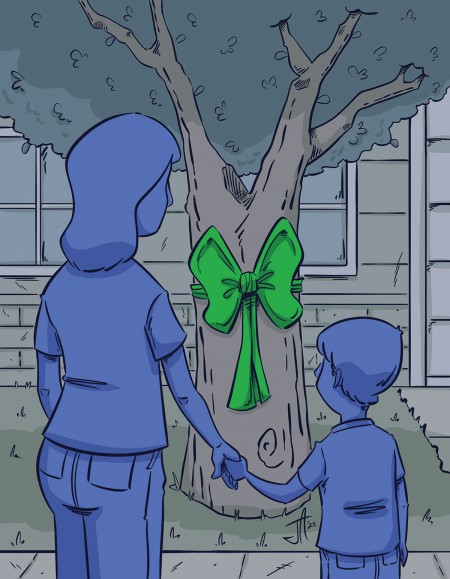Talking Through Tears: Leaning into community


COMING TOGETHER In times of tragedy, we grieve for ourselves, and we grieve for others, together. (Illustration: behance.net/runamokstudios)
As I write, we are days into an unimaginable week in Texas. For as many hurricanes and tropical storms as we have seen in Houston, the lightning-fast flooding of the Guadalupe River on July 4 has perhaps been the most disturbing.
It was not only the swiftness with which the flood took over communities and campgrounds, it was the surprise of it. We all have been shaken, heartbroken by the loss of 27 little girls and counselors at Camp Mystic, a place generations of women and girls considered a safe haven. Right now, it is impossible to think beyond the precious lost lives in the flood – more than 120 reported so far, as of this writing – and the families who loved them. They were our children, our grandchildren, our friends, our friends-of-friends. Where do we go from here?
Dr. John Price, who, with his wife Leila-Scott, founded The Center for Healing Arts & Sciences, says it is in our connectedness that we will find healing. “We need to do this together, in community,” says John, who is a psychotherapist and president of The Jung Center’s board of trustees. John and Leila-Scott, who respectively attended Camp Longhorn and Camp Mystic, picked up their 9-year-old daughter from her first summer at Mystic a week before the floods.
Communities are of course coming together to support the families most deeply touched by those losses. Still, thousands more are empathizing from afar, hearing accounts of the tragedy that has changed so many lives, watching videos that are traumatizing to see, and impossible to forget. Even if you weren’t directly affected, you were affected.
“The pain is of course different for somebody who lost a child and somebody whose friend lost a child, and somebody who is witnessing the loss,” John says. “But the differences don’t mean we diminish the pain.
“We want to put it in a hierarchy, but grief is grief. You don’t have to lose someone close, you don’t have to lose your home to feel loss. Everybody is experiencing this. We absorb the pain of others. We are grieving for ourselves, and we are grieving for others.”
John likens the experience to having a nightmare: “My body reacts as if the dream is real. Our systems have the capacity to be in the experience, and we behave as if we were in the experience, to feel what others feel.”
That we are so deeply affected by others’ pain demonstrates, John says, how deeply connected we all are. How do we move forward?
“Often we seek out whatever can make us numb out and check out. We prioritize the task, the to-do list, the status, making money,” John says. “But you have to have awareness for what’s happening inside of you. You can’t say I’m not directly affected and expect to feel fine.”
Instead, he says, we need to invest in connection.
“We need to engage in simple rituals of togetherness,” he says. “Call people you love. Be together. Share silence. We think we need to do something, but we just need to be together. It’s the sacred power of sitting with somebody. In the psychological world we call that ‘witnessing the experience,’ not trying to tie it up with a bow. Not using platitudes. Just being honest and saying I don’t know how to do this.
“When you invest in relationships, you know where to fall. Something magical happens when you lean on people, and let them lean upon you. It’s not comfortable, but it’s absolutely necessary. Many would say divine. I certainly would.”
Rooted in busy-ness, our culture, John says, lacks the “scaffolding” to help us process emotions. “In other cultures,” he says, “there is an underworld. But our culture has projected the underworld into the afterlife. There is no mythological orientation to help us understand where we are.” That, he says, is in a world where what we knew to be safe, no longer feels safe.
John references his mentor, the author and Franciscan priest Richard Rohr: “He says that in the absence of a mythology, we pathologize. We pathologize the process to try to fix things. But the psyche is self-healing, even though it might take a lifetime. As sad as it is, nobody gets out of this experience without grieving deeply.”
Still, John says, we can thrive. “We fold the experience into our lives. It deepens the experience of the ways we love, how we hold others, how we show up for others, how we think of the mysteries of our existence. Our existence broadens. We are transformed.”
In the transformation, life goes on. We are thankful for that, and we dread it. We will heal, but we will not forget. Until then, as John says, “We talk through tears.”
John Price and Richard Rohr will be in conversation at The Jung Center on September 17. Additionally, The Center for Healing Arts & Sciences offers a range of support groups. Go to junghouston.org and thecenterforhas.com for more information.
Editor's note: For more, read Before the Flood, After the Flood: A view from higher ground by Cindy Gabriel. Also, find a list of ways our community can help those impacted by the floods here.
Want more buzz like this? Sign up for our Morning Buzz emails.
To leave a comment, please log in or create an account with The Buzz Magazines, Disqus, Facebook, or Twitter. Or you may post as a guest.


